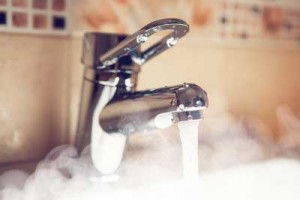Your water heater is one of the most important appliances in your home, yet it rarely gets the attention it deserves — until it breaks down. To keep hot water flowing to your faucets and appliances, it’s vital to do a few simple maintenance tips on a regular basis.
 Drain the Tank Annually
Drain the Tank Annually
What’s the number one enemy of any water heater? Built-up sediment. That’s why the experts recommend that you completely empty your water tank at least once a year.
Sediment comes in many forms such as silt and sand. However, a naturally-occurring mineral such as calcium carbonate is the main culprit of inefficient and broken-down water heaters.
Over time, calcium carbonate settles at the bottom of the tank and forms a hardened layer from the constant heating and cooling the system undergoes. This hardened layer acts as a buffer between the water and the heat source which makes the system work harder and in turn, increase your monthly bills.
Draining the tank is a fairly straight-forward process. Grab a large bucket, a few towels, and a hose to get started. It’s important to continue draining and rinsing the tank until the water that runs out is clear and free of sediment.
Check the Temperature Setting
Adjusting the temperature of your water heater is important as you’ll want to ensure the water is warm enough for a comfortable shower, but not hot enough to scald anyone, especially young children. So what’s the magic number? Most industry experts suggest presetting your water heater to 120 degrees F.
Here are a few other reasons to adjust your temperature:
- Prevent harmful bacterial growth. Did you know that temperature settings set too low aren’t able to effectively kill harmful bacteria? In rare cases, the combination of cool, stagnant water can cause Legionnaire’s disease, a form of bacterial pneumonia.
- Reduce energy consumption. Water heaters set too high burn up more fuel than is necessary. To go easier on the environment and your wallet, ensure your temperature is set to 120 degrees F.
Prevent Against Heat Loss
 Just as an attic or basement needs insulation to prevent heat loss, so too does your water heater. Older models would especially benefit from a layer of insulation from a blanket with R-11 or higher.
Just as an attic or basement needs insulation to prevent heat loss, so too does your water heater. Older models would especially benefit from a layer of insulation from a blanket with R-11 or higher.
Most newer models come with pre-built insulation that’s not visible on the outside. Check your manufacturer’s label for more information.
For gas heaters:
- Ensure you don’t completely cover the top, as this could be a fire hazard. Also avoid covering the anode, controller and pressure valve.
For electric heaters:
- Avoid covering the heating element panels.
Since 1979, James Caccia Plumbing Inc. has been proudly serving San Mateo, CA. See for yourself why we’re recipients of The Super Service Award from Angie’s List. Call us today at 650-342-5363 to book your appointment.

